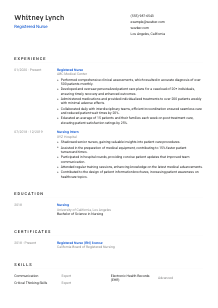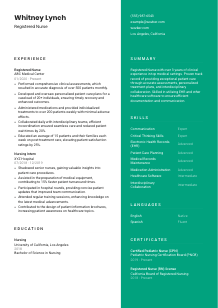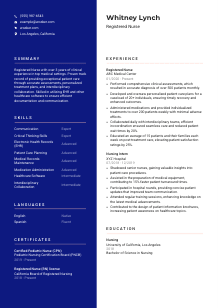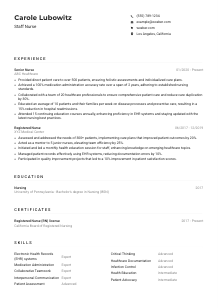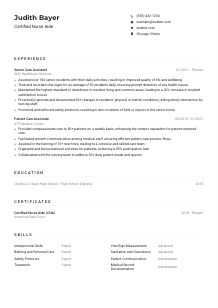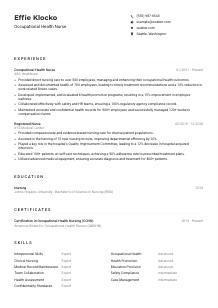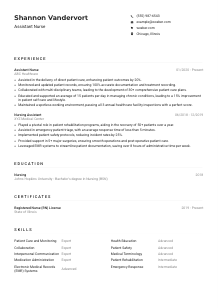Registered Nurse CV Example
Saving lives, but your CV feels a bit unresponsive? Delve into this Registered Nurse CV example, crafted with Wozber free CV builder. Discover how to seamlessly integrate your medical feats with job demands, ensuring your career prognosis is as healthy as those in your care!
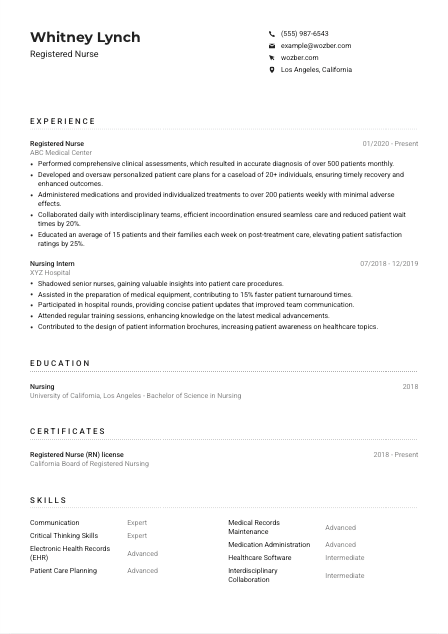
How to write a Registered Nurse CV?
Hello there, aspiring Registered Nurse! In the ever-evolving healthcare landscape, standing out to potential employers is not just an ambition – it's crucial. Your CV isn't just a document; it's a testament to your dedication, expertise, and the care you bring to patients every day.
Leveraging the power of the Wozber free CV builder, this guide is tailored just for you, to help you craft a CV that resonates with the specific needs of your dream job. Let's roll up our sleeves and ensure your CV not only meets the expectations but surpasses them, leading the way to your next big opportunity in the nursing field.
Personal Details
The Personal Details section is where you make your first impression, so it's essential to get it right. For a Registered Nurse, this means presenting yourself professionally and aligning your details perfectly with the job requirements. Let's break down how to polish this section specifically for a Registered Nursing position.
1. Put Your Name in the Spotlight
Your name is the beacon on your CV, guiding the hiring manager's attention. Make sure it shines bright by using a clean, professional font that's a tad larger than the rest of your text. This small detail ensures your name is memorable and easy to spot.
2. Sync with Your Professional Title
Immediately below your name, clear and proud, state your professional title. This signals to the hiring manager right off the bat that you're a perfect candidate for their Registered Nurse position. Matching the job title from the description subtly aligns your CV with the role you're pursuing.
3. Essential Contact Information
Include only your most current and accessible phone number and a professional email address that preferably follows the firstname.lastname@email.com format. Accuracy is key here; double-check to avoid any typos that could prevent employers from contacting you.
4. Location Matters
For many nursing roles, being local or willing to relocate is essential. By stating "Los Angeles, California" as your location, you're ticking off a major box in the job requirements, signaling to potential employers that you're ready and available to work in the specified location without the need for relocation arrangements.
5. Professional Online Presence
If you have a LinkedIn profile or a professional portfolio website, consider adding it. Ensure it's up-to-date and reflects your CV. A well-maintained LinkedIn profile can offer a more comprehensive look at your professional journey and achievements.
Takeaway
Your Personal Details section is the virtual handshake with your potential employer. It should be neat, professional, and perfectly tailored to the Registered Nurse position you're eyeing. Treat it as the gateway to the rest of your CV, paving the way for a strong first impression.





Experience
Next up, let's ensure your Experience section showcases the depth of your nursing expertise and directly correlates with what the job description seeks. Here's how to illuminate your past roles in a way that resonates with the requirements for a Registered Nurse.
- Performed comprehensive clinical assessments, which resulted in accurate diagnosis of over 500 patients monthly.
- Developed and oversaw personalized patient care plans for a caseload of 20+ individuals, ensuring timely recovery and enhanced outcomes.
- Administered medications and provided individualized treatments to over 200 patients weekly with minimal adverse effects.
- Collaborated daily with interdisciplinary teams, efficient incoordination ensured seamless care and reduced patient wait times by 20%.
- Educated an average of 15 patients and their families each week on post‑treatment care, elevating patient satisfaction ratings by 25%.
- Shadowed senior nurses, gaining valuable insights into patient care procedures.
- Assisted in the preparation of medical equipment, contributing to 15% faster patient turnaround times.
- Participated in hospital rounds, providing concise patient updates that improved team communication.
- Attended regular training sessions, enhancing knowledge on the latest medical advancements.
- Contributed to the design of patient information brochures, increasing patient awareness on healthcare topics.
1. Dissect the Job Description
Start by thoroughly reviewing the job description and underline any specific responsibilities or achievements it mentions. For our example, having "Performed comprehensive clinical assessments" and "Administered medications" directly reflects the job's needs and showcases your eligibility.
2. Chronological Format Works Best
Organize your experience in a reverse-chronological format, starting with your most recent role. Clearly state your job title, the name of the healthcare facility, and the duration of your employment there. This format is straightforward and favored by hiring managers in the healthcare sector.
3. Tailor Your Achievements
For each role listed, draft bullet points that highlight your achievements and responsibilities. Use action verbs and, where possible, quantify your achievements, such as "Educated an average of 15 patients weekly." This method adds weight to your accomplishments and shows the tangible impact of your work.
4. Quantify Where You Can
Numbers speak louder than words. Whenever possible, quantify your experiences, like "oversaw personalized patient care plans for a caseload of 20+ individuals." This gives a concrete measure to your contributions and effectiveness.
5. Relevance is Key
Focus on experiences that directly relate to being a Registered Nurse. While it might be tempting to include unrelated accolades, remember that relevance trumps quantity. Every point should build the case for why you're the perfect fit for the role.
Takeaway
Your Experience section is more than a list; it's a narrative of your professional journey in nursing. It's your chance to demonstrate how you've not only met the demands of previous roles but how you're primed to excel as a Registered Nurse. Focus on relevance, clarity, and quantified achievements to make your experience shine.
Education
The Education section of your CV is a cornerstone, especially in a field as critical as nursing. It's here you'll showcase the rigorous training and knowledge you've accumulated. Let's craft this section to reflect not just your qualifications, but your commitment to excellence in nursing.
1. Highlight the Necessary Degrees
The job description asks for a "Bachelor's degree in Nursing (BSN) from an accredited institution." Make sure your education section begins with this qualification, clearly stating the degree, field of study, and the institution where you earned it.
2. Simplify Your Structure
For clarity and ease of reading, list your educational background in a simple, straightforward format. Mention your degree, the field of study, the name of the university or college, and your graduation date. This structure is easy for ATS and hiring managers to scan.
3. Degree Specificity
If the position demands a specific degree, such as a BSN for a Registered Nurse, it's crucial to list it exactly as it appears in your educational credentials. This helps with ATS optimisation, ensuring your CV passes through any potential filtering algorithms.
4. Coursework and Honors
Though not always necessary, for newer graduates, relevant coursework, honors, and distinctions can add depth to your CV. If you performed exceptionally well or completed coursework directly relevant to the position you're applying for, it's worth a mention.
5. Additional Achievements
Did you lead any student nursing associations, volunteer in health drives, or take part in research projects? Such experiences can showcase your leadership skills and your dedication to the nursing field beyond the classroom.
Takeaway
Your Education section is a testament to the foundation of your nursing career. Ensure it's accurately tailored to match the job's requirements, using clear and precise language. This section not only signifies your eligibility but also your commitment to a lifelong journey in healthcare.
Certificates
In the nursing field, certifications can significantly bolster your CV by highlighting your specialized skills and continued commitment to professional development. Let's align your certifications with the job requirements to show you're not just qualified, but dedicated.
1. Identify Certificate Requirements
The job description specifies a "Valid Registered Nurse (RN) license in the state of practice." Begin your Certificates section with this essential credential, ensuring it's listed clearly and accurately to catch the hiring manager's eye immediately.
2. Select Relevant Certifications
Include certifications that are most relevant to the Registered Nurse position you're applying for. For instance, if you have a "Certified Pediatric Nurse (CPN)" certification and it's relevant to your nursing specialty, it's worth including. This showcases your expertise in a specific area of nursing.
3. Dates Matter
For certifications with expiration dates or recertification requirements, like the RN license, ensure to include the dates to demonstrate that your credentials are current. This transparency is critical for roles with stringent licensing requirements.
4. Continuous Learning
The healthcare field is always advancing, so showing a commitment to continuous learning through up-to-date certifications can set you apart. It demonstrates you're not just keeping pace but actively engaging with the latest in nursing practice.
Takeaway
Your Certificates section is a showcase of your specialized knowledge and ongoing commitment to professional growth. Precisely align this section with the job's certification requirements, and use it to underline your readiness and enthusiasm for the Registered Nurse role.
Skills
The Skills section of your CV is where you get to shine a spotlight on the competencies that make you an outstanding Registered Nurse. This is your chance to match your skills directly with what's required by the job description, demonstrating you're the perfect fit.
1. Match Job Description Skills
Start by identifying both the explicit and implicit skills mentioned in the job listing. For instance, "Proficiency in using Electronic Health Records (EHR)" is a clear match for the job requirements, and it's a skill that should definitely find its place on your CV.
2. Highlight Pertinent Skills
Prioritize listing the skills that align most closely with the job description, such as critical thinking and communication skills for a Registered Nurse. This targeted approach ensures that your CV speaks directly to the needs of potential employers.
3. Clean and Organized Layout
Resist the temptation to list every skill you've ever acquired. Instead, focus on a curated selection of skills that best match the job listing. An organized, easy-to-read format can significantly enhance the scan-ability of your CV.
Takeaway
Your Skills section is a concise portfolio of your professional abilities. By tailoring this section to reflect the skills sought after in the job description, you're directly addressing the employer's needs. Keep it neat, relevant, and impactful to leave a lasting impression.
Languages
In the diverse field of nursing, language skills can be a significant asset, especially in multicultural cities or for roles requiring interaction with non-English speakers. Let's explore how to strategically present your language skills to enhance your appeal as a Registered Nurse candidate.
1. Review Language Requirements
First, check if the job posting outlines any specific language requirements. For our Registered Nurse example, proficiency in English is a must. If you're bilingual or multilingual, especially in languages prevalent in your area of practice, it can be an added advantage.
2. Prioritize Essential Languages
If the job description highlights a need for specific language competencies, ensure those are prominently listed in your Languages section. Your level of proficiency should be clearly stated to give hiring managers an immediate understanding of your capabilities.
3. Include Additional Languages
Beyond the requirements, listing additional languages you're proficient in can set you apart. This demonstrates versatility and the ability to communicate with a broader range of patients, an invaluable skill in many healthcare settings.
4. Honesty is the Best Policy
Be truthful about your level of proficiency in each language. Overstating your abilities can lead to challenges on the job. Use clear terms like 'native', 'fluent', 'intermediate', and 'basic' to describe your skills accurately.
5. Consider the Job Scope
When deciding which languages to include, consider the role's scope and the demographic of the patients you'll be serving. In areas with a significant number of non-English speakers, being fluent in a second language could be a key differentiator.
Takeaway
Your language skills can bridge communication gaps and enhance patient care, making you a more appealing candidate for the Registered Nurse role. Showcase your linguistic abilities accurately, and let them signify your readiness to serve a diverse patient population.
Summary
The Summary section of your CV is your chance to distill your most noteworthy achievements, skills, and experiences into a concise introduction. Tailoring this segment specifically for a Registered Nurse position can set the tone for the rest of your CV and draw the hiring manager in.
1. Grasp the Job's Core
Begin by understanding the essence of the Registered Nurse position. The job's core might include patient care, medication administration, and collaboration with interdisciplinary teams. Start your summary by reflecting on these critical aspects.
2. Kickoff with Your Profession and Experience
Open your summary with a clear statement about your professional identity and the depth of your experience. For instance, "Registered Nurse with over 3 years of clinical experience in top medical settings" immediately establishes your credibility and relevance.
3. Address the Role's Needs
Highlight your most relevant skills and accomplishments in your summary. Point to your proven track record in patient care, use of EHR, and efficient teamwork. This directly relates your expertise to what the job description is asking for.
4. Keep It Snappy
The summary is a teaser, not the full story. Aim for 3-5 lines that capture the essence of your professional background and how it aligns with the Registered Nurse role. Make every word count and entice the hiring manager to keep reading.
Takeaway
The summary section is your opening argument for why you're the best fit for the Registered Nurse position. By succinctly showcasing your qualifications and tailoring this section to reflect the job's requirements, you set a confident tone for your entire CV.
Launching Your Registered Nurse Journey
You've meticulously crafted each section of your CV, weaving together your experience, education, certifications, skills, languages, and summary into a compelling narrative. Remember, your CV is more than just a document; it's a reflection of your commitment, expertise, and the compassionate care you bring to the nursing profession. With these tailored tips and the support of Wozber's free CV builder, including the ATS-friendly CV template and ATS optimisation tools, you're on your way to making a significant impact in the healthcare world. Go ahead, take the next step in your nursing career with confidence and aim for excellence!

- Bachelor's degree in Nursing (BSN) from an accredited institution.
- Valid Registered Nurse (RN) license in the state of practice.
- Minimum of 2 years of clinical experience preferably in a hospital setting.
- Proficiency in using electronic health records (EHR) and other healthcare software.
- Strong interpersonal, communication, and critical thinking skills.
- Competence in both spoken and written English is essential.
- Must be located in Los Angeles, California.
- Perform clinical assessments, develop and oversee patient care plans.
- Administer medications and provide individualized treatments as prescribed.
- Collaborate with interdisciplinary teams to coordinate and provide the best care for patients.
- Educate patients and their families on various health conditions and treatment options.
- Maintain accurate medical records and ensure compliance with legal and ethical standards.





